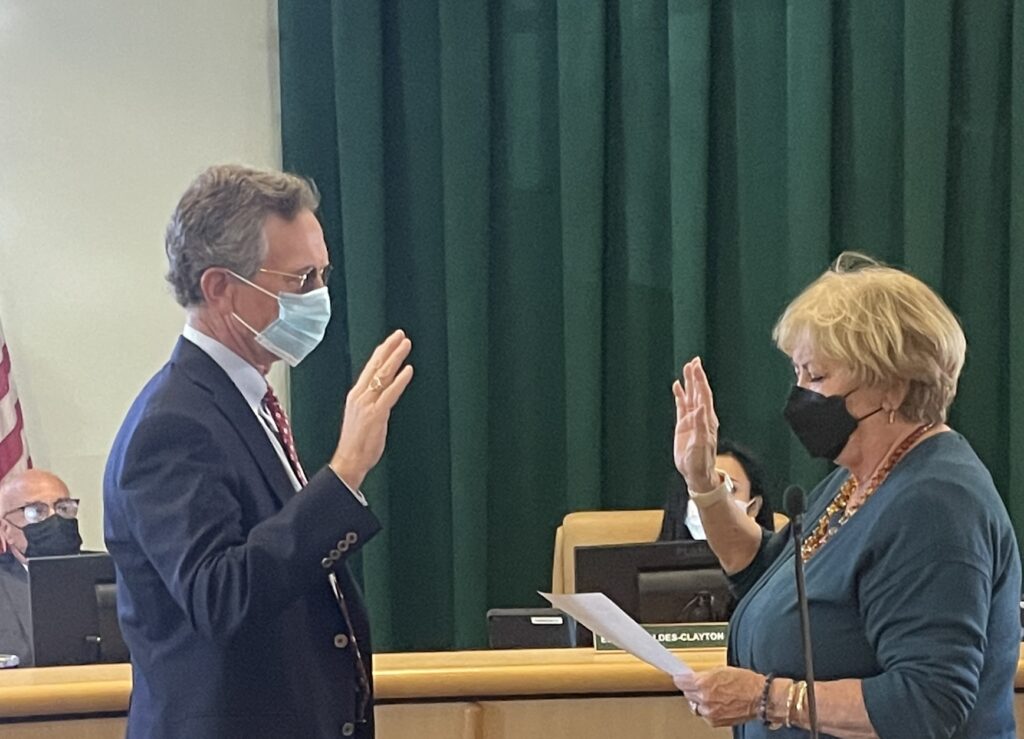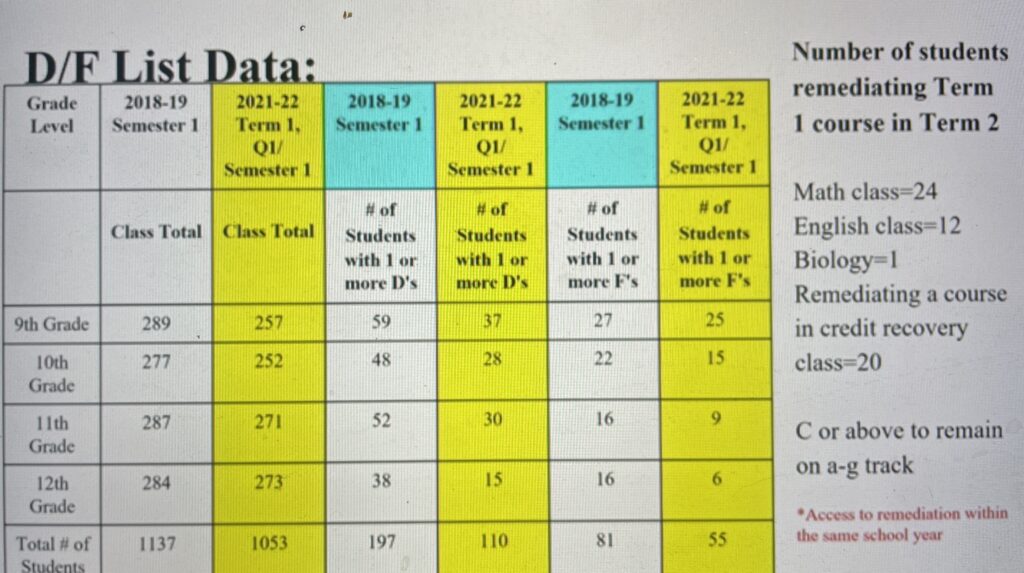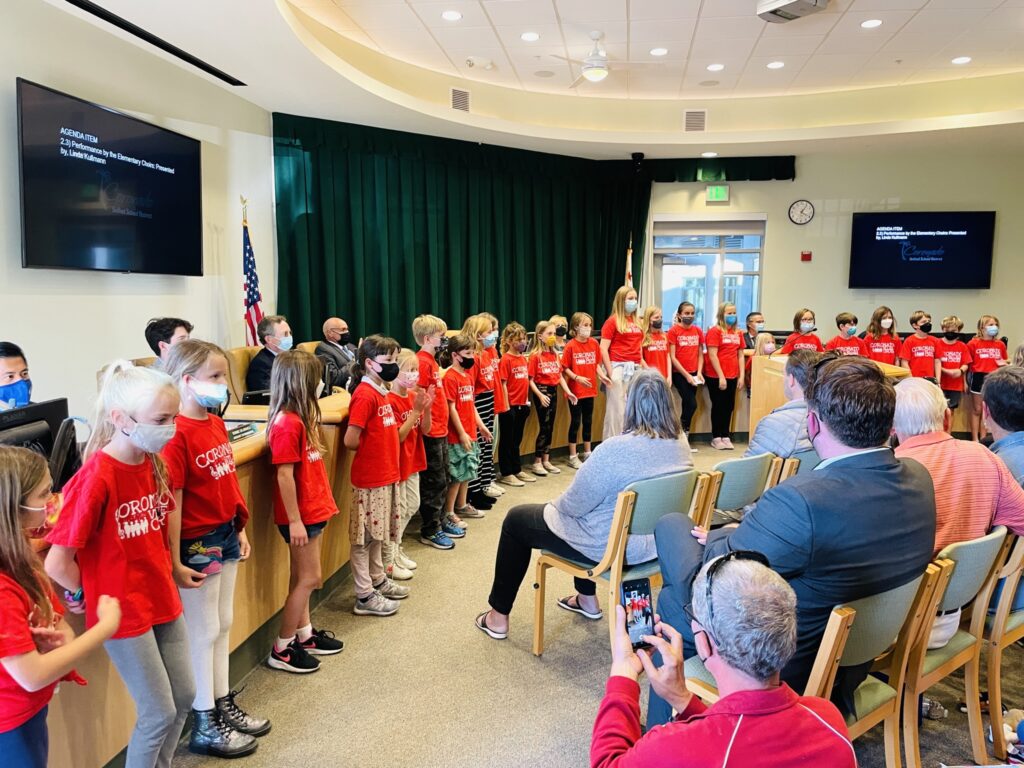The Coronado Unified School District school board trustees met on Thursday, February 17th at District Offices where newly-appointed Trustee Bruce Shepherd was sworn in for service and Coronado High School Principal Karin Mellina was on hand to deliver a detailed annual report on CHS; but not before impassioned community members shared their concerns over continuing mask mandates, calling mask requirements “child abuse.”

Several speakers spoke about a CHS student who reportedly removed her mask in protest and was asked to leave her classroom. The mother of the student, Nicole Ward from El Cajon, said that her daughter was simply exercising her constitutional and educational rights, only to have them ignored by the school board.
Video below from February 17th school board meeting:
“She sat on campus for thirteen days, with limited education, discrimination from staff and students, and continued threats to have her continued enrollment in this district removed,” said Ward. “I’ve heard time and time again that your hands are tied … I invite you to stand up for our children, and to make the decision to stop the madness now.”
A man who identified himself as the attorney of the student said the girl had to wear an electric jacket so she could stay warm outside while her classmates were in class.
“She just wants to have the in-person education she’s entitled to under the California Constitution,” said Ryan Heath, an attorney licensed in Arizona and President and CEO of a nonprofit called the Gavel Project. “It’s frankly ridiculous that you would take a child, and stick them out the cold, so cold that she has to wear an electric jacket. This is exposing all of you to liability, and that’s why I’m here. I’m here to sue you.”
Then Heath, who did not wear a mask, announced that he was unvaccinated. Earlier in the meeting, Board President Esther-Valdes Clayton said masks were optional, but required for the unvaccinated, per state mandate. When a community member said the man should be escorted out of the meeting, a ruckus ensued. Valdes-Clayton adjourned the meeting for a break, prompting community members to call out in frustration.
One person shouted, “drama queen,” while another yelled, “You are all cowards.” Another said, “recall the whole board,” and a man called them “child abusers” and said they needed “to be arrested.”
After the brief recess, several more members of the public spoke about masks, asserting that mask-wearing is unfair, psychologically damaging and responsible for one young student’s speech impediment. Another speaker said that mask-wearing was harmful to the health of his autoimmune-compromised son. Several speakers said that the district had the power to move to mask choice and named two other California school districts that had done so.
Later in the meeting when board business was handled and educational topics covered, the topic of masks was revisited. At this point, much of the room had cleared and most of the community members who had expressed concerns about masking had left. Superintendent Karl Mueller said that he thought it would be helpful to have a community forum with regards to the district constraints on masking.
“There is a lot of misinformation in regards to what we do and do not have autonomy over as it relates to mandates and guidelines, but there are also some very legitimate items for us to consider,” said Mueller. “When we went into the pandemic we negotiated with our entire staff on what would it take to bring them back into the workplace, and adherence and compliance with County of Public Health guidelines is one of those non-negotiables.”
He said that if a child removes their mask the class could not continue, as it would be in violation of the district’s collective bargaining agreement with the district labor groups. Valdes-Clayton echoed this statement later in the meeting.
“We entered into an agreement with the teachers, and we said we would adhere to the state guidelines,” said Valdes-Clayton. “That was what we sold them on; that is why our schools were open before anybody else in the county.”
Mueller said another factor was the district’s requirements to Cal-OSHA and the liability faced as a school district.
“We have local cases against us through Cal-OSHA for staff members who have fallen ill and passed away from COVID. This is something that is part of our reality that isn’t a part of the impassioned dialogue,” said Mueller.
Trustee Helen Anderson-Cruz and Valdes-Clayton advocated for a community meeting or town hall discussion to share more information with the community.
“There was a lot of energy tonight around masks. I would like more information that we can share with our community because there is some misinformation out there,” said Anderson-Cruz.
Valdes-Clayton asserted that the townhall would help the community learn, not just about what the district can’t do, but what it can do.
“People need to know what the limits are, and we need to discuss local control and how Sacramento is making decisions for Coronado,” said Valdes-Clayton. “And parents want to know, what is the protocol that’s being followed when a student takes off their mask …what is the plan B if the student doesn’t want to wear their mask?”
Mueller shared that students who wish to remain mask-less are able to learn via the CCD program or virtual learning, as well as independent study, but that these are not appealing options for some members of the community who are questioning state and county guidelines. Governor Gavin Newsom is expected to make an announcement on February 28th regarding state-wide mandates, and Mueller said that local advocacy was best directed at County Public Health within California. But he underscored the importance of getting better information from Sacramento and [San Diego] County Public Health.
“We need to ask them, what are the metrics that determine these guidelines? What is the timeline? Give us some information we can share with our community. Give us some hope,” said Mueller.
Principal Mellina was at the meeting to share her CHS annual report. She said that enrollment was on an upswing with 1068 students enrolled at CHS, and that the students were outperforming benchmarks and national averages on standardized tests. When it comes to A.P. scores, Mellina did note a decline and attributed it to COVID learning, but she also shared that the D and F list is down from the last regular in-person school year, which was 2018-2019.

When it comes to college and career readiness, Mellina shared that CHS offers 12 pathways for career technical education, including those in the performing arts, health sciences, computer sciences, building and construction, and engineering and architecture. Students are also able to participate in an internship class and work with local community organizations like the Coronado Historical Association, InclusioNado, Sharp Hospital and Emerald Keepers.
In regards to the 4×4 bell schedule, Mellina noted that the new setup allowed students to remediate within the same year, as well as make up for lost credits. She shared that currently 37 students are remediating a class. In the past, students would have had to do this during summer school, or at some other time. Students were recently surveyed about the benefits of the 4×4, which includes fewer classes and more flexibility, as well as the drawbacks, which are the schedule’s fast pace and impact of absences.
Declan Dineen, the ASB president, gave his perspective on the student experience. He said that many students were negative about the new schedule at the beginning of the year, but now they seem confident and happy.
“While the courses are fast-paced, I think it’s important to note that in the past, students were taking five to six academic classes per term, whereas now they are taking two to three academic classes each term,” said Dineen. “So in the past, students were spread thin in a bunch of different subjects, now they are able to master the classes more.”
Later in the meeting, ACT president Jennifer Landry shared that high school teachers are challenged with setting up an entire new class in just one day allotted under the current plan. The board promised to consider some options to allow teachers more prep time.
In other board business, AP World History textbooks were approved for adoption, and the $35,000 grant for A-G requirements was discussed. Mueller announced that the district will facilitate a community forum to work on the Long-Range Plan on Thursday, February 24, 5-6:30pm in the boardroom.
Earlier in the night, the boardroom was treated to a soulful performance of the Village Elementary School Choir by Linda Kullmann. The students sang an uplifting the song, clapping hands high above their heads along to the lyrics of, “We’re ready to shine, we’re ready to shine, we’re going burst so bright.”
The next CUSD school board meeting will take place on Thursday March 10th at 4pm.





